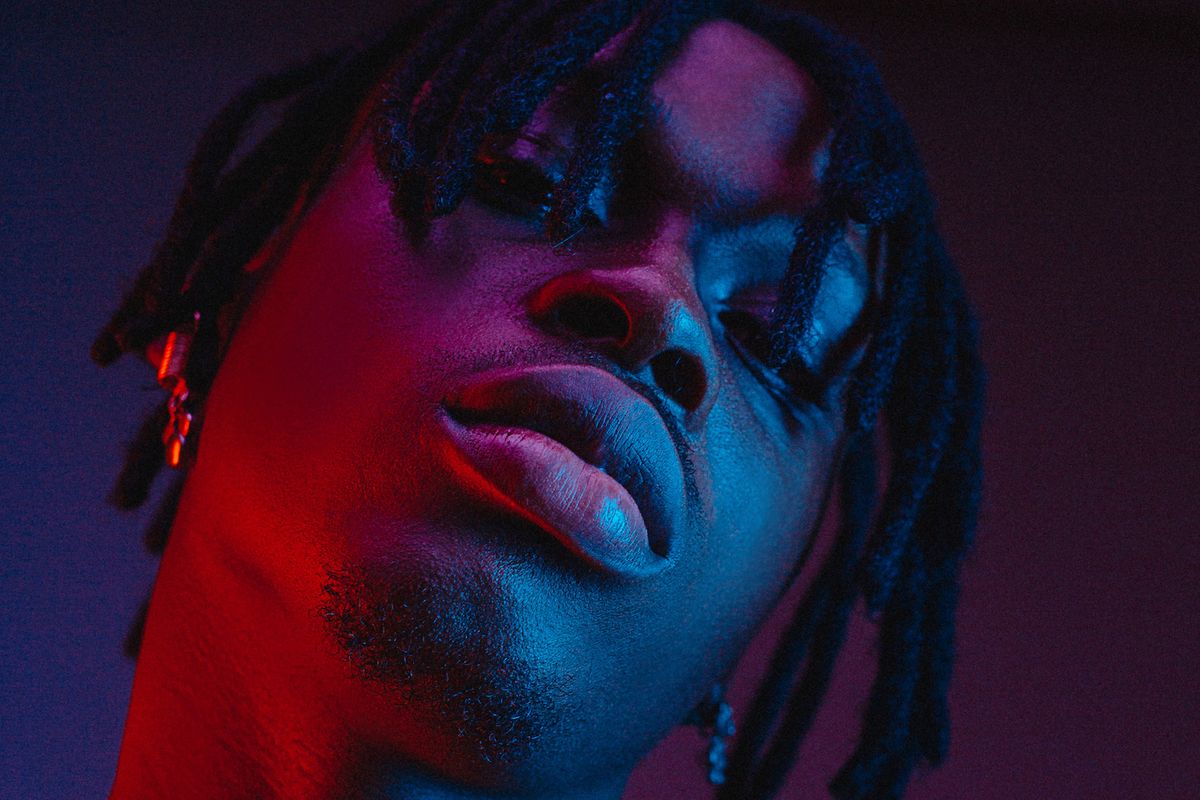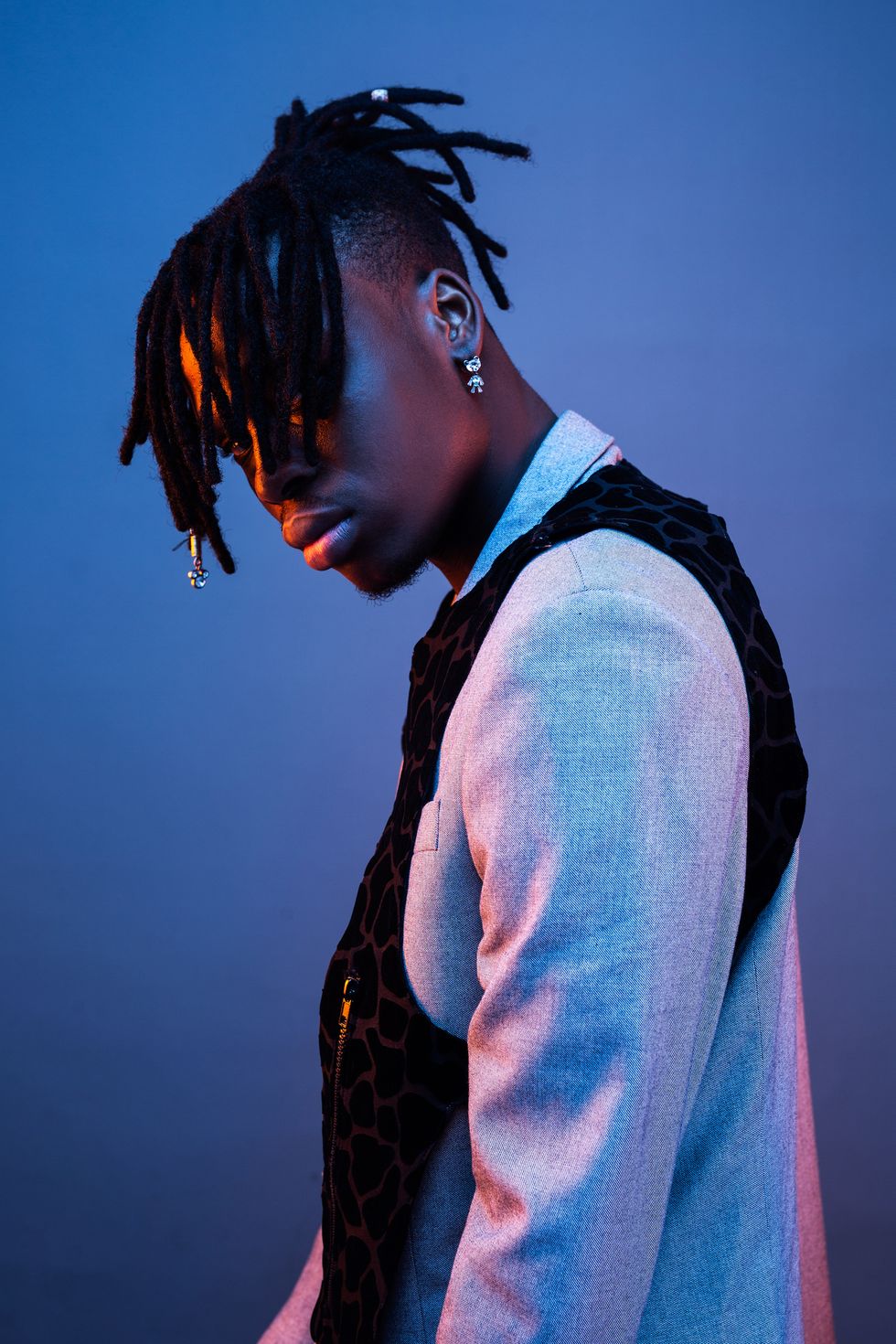Interview: Fireboy DML Gets Deep & Personal with 'Apollo'
The 'Afro-Life' singer wants to show that Afrobeats can be cohesive and more than just vibes, beats, and instrumentals.

Image courtesy of Fireboy DML.
Fireboy DML is one of the custodians of the modern African music totem. Following his signing to YBNL, helmed by veteran artist Olamide, the singer burst onto mass appeal in early 2019 with his genre-defying smash hit, "Jealous", initially housed under the label's December 2018 compilation project. "Jealous" ruled digital charts, airwaves and contended for Song of the Year at The Headies Award, Nigeria's most prestigious music award.
Singles like "What If I Say," "King" while sustaining momentum, made way for his debut album dubbed Laughter, Tears and Goosebumps. The album houses zero features and has been hailed as one of the most critically acclaimed albums amidst Nigerian classics like Wande Coal's Mushin to Mohits. According to Fireboy, LTG was aimed to introduce the world to his sound, which the singer touts as Afro-Life. "It is not a genre; my music is different and I feel it deserves to own an identity," he said. This identity encompasses balancing his love for R&B, contemporary pop, Afro-pop, with affectionate, gleeful or melancholic motifs. The singer, who co-wrote "Temptation" by Tiwa Savage and Sam Smith, is often lauded for his songwriting abilities.
Following singles such as "New York City Girl," "Eli," "Tattoo," the singer born Adedamola Adefolahan released his sophomore album, Apollo. The new album features D Smoke, Olamide and Wande Coal, who Fireboy acknowledges as one of his musical influences. Unlike LTG, Apollo sees Fireboy bring to light to his persona. Chatting with the singer, we spoke about the genesis of his artistic persona, cutting through the noise of mainstream African music with witty lyricism, and driving a novel narrative about Afrobeats through his music.

Did the lockdown have an eventual toll on Fireboy or his creativity?
Not exactly. My creative process hinges on me being in my personal space. It helped me be more productive, speeding my recording process. Apart from being unable to perform, it's been fun as I'm typically an introvert. It's nothing foreign for me.
Tell us about Damola before Fireboy.
Damola was an average boy from a family of 5, the first of three sons. I grew up indoors in Abeokuta, Ogun state. It was really just going to school and returning. As a loner, I found solace in writing poetry, reading books which helped in building my vocabulary and artistic persona. I studied English at Obafemi Awolowo University, Ile-Ife, where I realized music is what I'd want to spend the rest of my life doing. This prompted my relocation to Lagos without knowing anybody prior. Knowing Lagos as the hub of entertainment in Nigeria, some friends and I decided to move instead of settling with local fame at Ile-Ife as we were already known there but we wanted more.
What are some experiences you encountered moving to Lagos knowing nobody prior?
Some challenges that became a learning curve and motivation for me. I met good people who I was able to squat with while we just made music. I also met really terrible people, even popular ones who exploited my songwriting abilities. I wrote a couple hit songs unknown, unpaid, unacknowledged, which was actually the last straw that pushed me into working harder. I knew I couldn't afford to fail as these people have messed me up. I'm thankful to those people and the experiences.
FIREBOY DML - VIBRATIONwww.youtube.com
Who did you grow up listening to and did they at any point play a role in shaping your sound?
Courtesy of my parents, I grew up listening to 2baba, Celine Dion, Ayefele whose influence you'll hear in some of my music when I sing Yoruba.. Personally, I fell in love with pioneers of modern Afropop like Wizkid, Olamide, Davido etc. Then, I got deep into Elton John, Jon Bellion, Passenger, Wande Coal who are actual influences of my music and sound.
In mainstream African music, witty lyricism is barely at the fore but you've since established a sound that embodies that. Before now, did you at any point fear it might not cut through the noise?
There was no doubt or pressure whatsoever because I knew that's exactly what I needed to break in. Wizkid, Davido, Reekado Banks had conquered virtually every style in the African music scene. I just knew lyricism was what I needed; something beyond the typical vocals, vibes, beats etc. I'm good with words, so I thought to infuse it into Afrobeats and see what happens.
Your sound is touted as "Afro-Life," kindly give a hint on what that entails.
First, I'm just a Nigerian man making music for the global audience but I called it Afro-Life as a definition, an identity for my music. It's definitely not a genre; my music is different and I feel it deserves to own an identity.
What was the creative process for Laughter, Tears & Goosebumps like?
For LTG, it was undiluted energy. Just myself, two producers, Olamide in a beautiful atmosphere making music. It took about 5 days. The beauty of that album stems from how organic the process was. After Jealous, What If I Say, King, I queried myself on how I would want to stand out and an album was about the answer. I didn't intend to feature anybody, it was just me wanting to introduce my sound to the world.
What's the most rewarding result for you from LTG?
I'm obsessed with my legacy as a musician. So, LTG opened the way, stamping my status as a musician in Africa and the world. It made everyone listen and want to pay attention to what I have to offer and Apollo really just sealed it.
Tell us about Apollo and how it came about just nine months after your debut.
Basically, it was like a collected chain of events. I got a deal off the joint venture between Empire and YBNL, making a project inevitable. I had thought about it hence my hiatus after LTG, so it just all blended. Unlike LTG, this took about two weeks because I'm in an entirely different mindspace. I knew that if I put out a LTG 2.0, it might be widely acclaimed and die off after a few months. I was in a god-mode mindspace which explains the title of the album. Apollo is a greek god of music and poetry which summarizes my persona and how I perceive myself. Ironically, it's named after a god but most of the songs talk about humanity and flaws. "Airplane Mode" for instance talks about the price of fame, no matter how strong-willed you might be. For someone like myself who's a loner, locks everyone out, and just puts my phone on Airplane mode—hence the title.
Which was the most challenging song to make off Apollo?
"24 (interlude)." It is the shortest and most personal song on the album. It's so personal, nobody understands the meaning of the song and I can't say what it's about. It was so painful for me to express and most difficult to make that's why I couldn't let out so much hence its length.
What do you aim to achieve with Apollo?
I want people to realize that Afrobeats is beyond vibes, beats, instrumentals etc. Afrobeats is so much more. I want to show the world that Afrobeats can be deeper, personal, expressive etc. Also, that an Afrobeats album can be cohesive. I think I have succeeded in making that point, it might just take a while to digest, in that attention span is at an all-time low especially in a place like Nigeria. I bet they'll eventually realize how beautiful and deep the album is.
As one who isn't big on collaboration, what's a Fireboy dream collaboration like?
I already have one with Wande Coal, so it would be Fireboy featuring Jon Bellion, Passenger. Honesty is the soul of songwriting and these two are honest songwriters. It's something I really look forward to and I believe it'll be the deepest and most honest song ever.
Pheelz was predominantly hands-on with LTG and Apollo, what's about your working relationship with the producer?
We connected on many levels from the jump and even made a song together the first day we met. Our personas blend well enough. He's intelligent, a genius, experimental, versatile and importantly, can play the piano which is a huge one for me. He'd mentioned our impending synergy when Olamide announced my signing, like he already knew.
Which other producer do you believe that you can create such magic with?
Save for producers I've worked with, it'll be Melvitto. His melodies are out of this world, his beats are always melodious and simple. He lets the beat do its thing and the artist to do theirs. I don't know how he does it but I'll really love to work with him.
- This Is What Adekunle Gold Is Listening to Right Now - OkayAfrica ›
- Meet Uncle Soft, the Stylist Dressing Lagos' New Class of Musicians ... ›
- The 8 Best Nigerian Songs of the Month (August) - OkayAfrica ›
- Watch Fireboy DML's New Music Video for 'Need You' - OkayAfrica ›
- Fireboy DML 'Vibration' - OkayAfrica ›
- Fireboy DML "Need You" - OkayAfrica ›
- Watch Fireboy DML's New Music Video for 'Vibration' - OkayAfrica ›
- Listen to Fireboy DML's New Album 'Apollo' ›
- Watch Fireboy's New Music Video for 'New York City Girl' - OkayAfrica ›
- Listen to Fireboy DML's New Album 'Apollo' - OkayAfrica ›
- Fireboy DML Scores A Spot On the FIFA 21 Official Soundtrack ›
- Listen to Fireboy DML's New Album 'Playboy' - OkayAfrica ›
- Interview: Fireboy DML On Embracing His Inner 'Playboy' - OkayAfrica ›
- Watch Fireboy DML's New Video For "All of Us (Ashawo)" - OkayAfrica ›
- Fireboy DML Releases New Single and Music Video For ‘Someone’ - OkayAfrica ›

